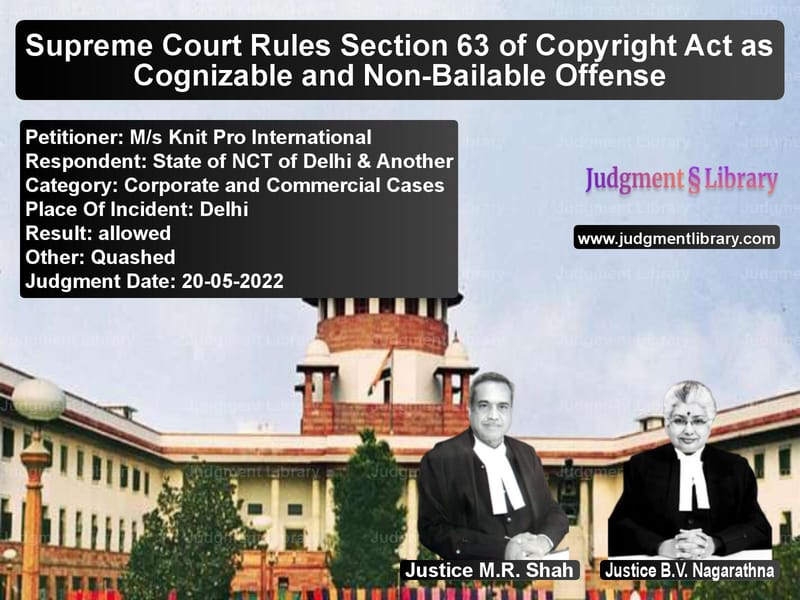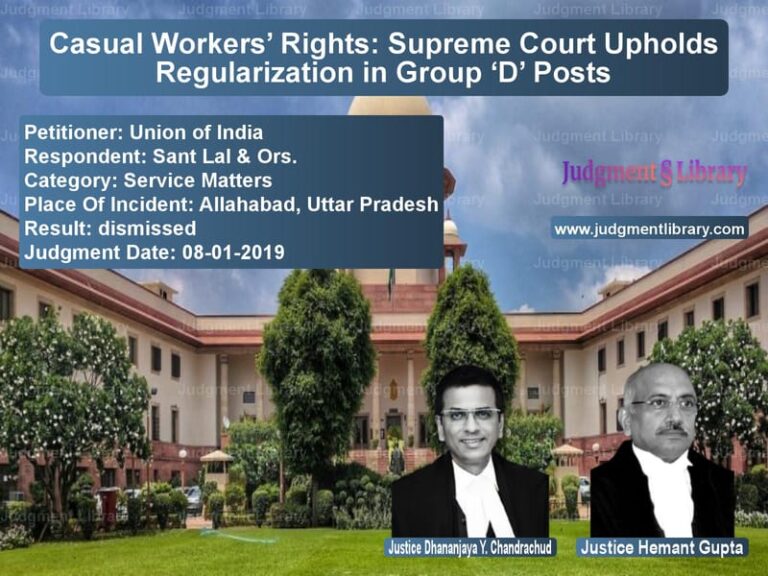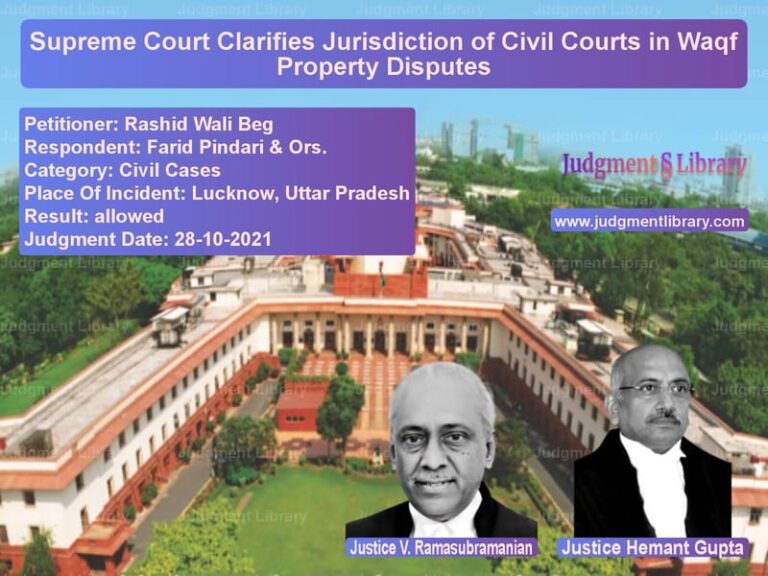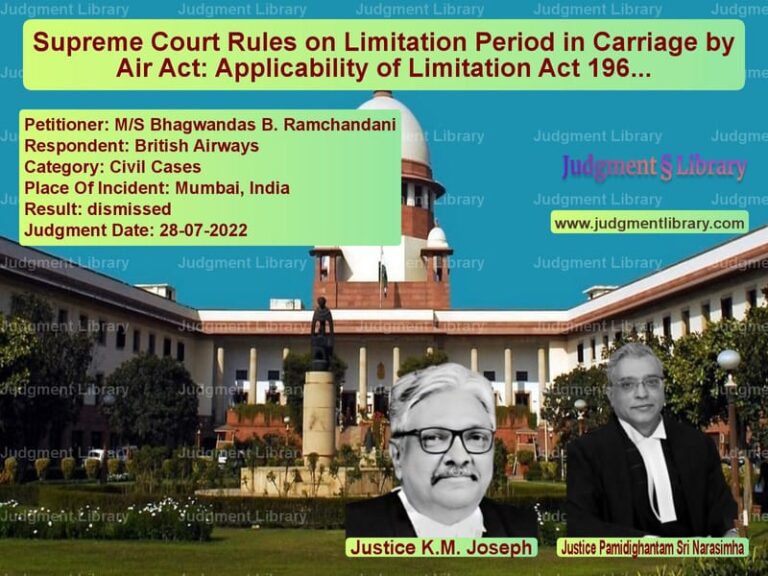Supreme Court Rules Section 63 of Copyright Act as Cognizable and Non-Bailable Offense
The Supreme Court of India recently ruled in M/s Knit Pro International vs. State of NCT of Delhi & Anr., clarifying that offenses under Section 63 of the Copyright Act, 1957 are cognizable and non-bailable. This decision overturned the Delhi High Court’s ruling that had quashed an FIR filed under the Copyright Act, citing the offense as non-cognizable. The judgment establishes a crucial precedent regarding copyright infringement cases and the extent of police authority in such matters.
Background of the Case
The case originated when M/s Knit Pro International filed an application under Section 156(3) of the Criminal Procedure Code (CrPC), requesting directions from the Chief Metropolitan Magistrate (CMM) for registering an FIR against the accused under Sections 51, 63, and 64 of the Copyright Act, read with Section 420 of the Indian Penal Code (IPC). The learned CMM granted the request, leading to the registration of FIR No. 431 of 2018 at the Bawana Police Station, Delhi.
However, the accused challenged the FIR in the Delhi High Court, arguing that the offense under Section 63 of the Copyright Act was non-cognizable. The High Court accepted this argument and quashed the FIR, prompting an appeal to the Supreme Court.
Key Legal Issues
- Whether Section 63 of the Copyright Act constitutes a cognizable and non-bailable offense.
- Whether the High Court erred in quashing the FIR on the ground that the offense was non-cognizable.
- The interpretation of Part II of the First Schedule of the CrPC concerning offenses punishable by imprisonment for three years.
Arguments by the Petitioner (M/s Knit Pro International)
The petitioner argued that:
- The punishment under Section 63 of the Copyright Act is imprisonment for a term of six months to three years, making it a cognizable offense.
- According to Part II of the First Schedule of the CrPC, an offense is cognizable if punishable by imprisonment of three years or more.
- The High Court failed to correctly interpret Supreme Court precedents, particularly Rakesh Kumar Paul vs. State of Assam (2017).
- The offense involves infringement of copyright on a commercial scale, which requires stringent legal action.
Counterarguments by the Respondent (Accused)
The accused contended that:
- The offense under Section 63 of the Copyright Act is punishable by imprisonment of up to three years, making it non-cognizable.
- As per judicial precedent, only offenses punishable by imprisonment exceeding three years are cognizable.
- The High Court correctly interpreted Rakesh Kumar Paul vs. State of Assam and rightly quashed the FIR.
Supreme Court’s Observations
1. Offenses Punishable by Three Years or More Are Cognizable
“For the offenses under Section 63 of the Copyright Act, the punishment shall be imprisonment for a term which shall not be less than six months but which may extend to three years. Therefore, the maximum punishment which can be imposed would be three years.”
The Court ruled that any offense where imprisonment extends to three years falls under the category of cognizable offenses.
2. Misinterpretation of Legal Precedent
“The High Court has committed a grave error in holding that the offense under Section 63 of the Copyright Act is a non-cognizable offense.”
The Court criticized the High Court for failing to apply Part II of the First Schedule of the CrPC correctly.
3. Stringent Copyright Enforcement
“Copyright infringement on a commercial scale requires strict legal measures, and the power of law enforcement agencies to investigate such offenses must not be curtailed.”
The ruling emphasized the importance of protecting intellectual property rights through proper legal enforcement.
Final Judgment
The Supreme Court ruled:
- Section 63 of the Copyright Act is a cognizable and non-bailable offense.
- The Delhi High Court’s order quashing the FIR was set aside.
- The criminal proceedings against the accused were directed to continue.
- The investigation under FIR No. 431 of 2018 was ordered to proceed in accordance with the law.
Impact of the Judgment
This ruling has significant implications:
- Strengthened Copyright Enforcement: The judgment allows police to initiate investigations and arrests in copyright infringement cases without prior court approval.
- Clarification on Cognizability: The decision resolves ambiguity regarding whether offenses with a maximum punishment of three years are cognizable.
- Legal Precedent: Future cases involving copyright violations will follow this interpretation, ensuring stricter intellectual property enforcement.
- Protection of IP Rights: Businesses and copyright holders gain stronger legal backing in pursuing action against copyright infringers.
With this decision, the Supreme Court has reinforced the significance of copyright laws and the necessity for effective enforcement mechanisms to safeguard intellectual property.
Petitioner Name: M/s Knit Pro International.Respondent Name: State of NCT of Delhi & Another.Judgment By: Justice M.R. Shah, Justice B.V. Nagarathna.Place Of Incident: Delhi.Judgment Date: 20-05-2022.
Don’t miss out on the full details! Download the complete judgment in PDF format below and gain valuable insights instantly!
Download Judgment: ms-knit-pro-interna-vs-state-of-nct-of-delh-supreme-court-of-india-judgment-dated-20-05-2022.pdf
Directly Download Judgment: Directly download this Judgment
See all petitions in unfair trade practices
See all petitions in Judgment by Mukeshkumar Rasikbhai Shah
See all petitions in Judgment by B.V. Nagarathna
See all petitions in allowed
See all petitions in Quashed
See all petitions in supreme court of India judgments May 2022
See all petitions in 2022 judgments
See all posts in Corporate and Commercial Cases Category
See all allowed petitions in Corporate and Commercial Cases Category
See all Dismissed petitions in Corporate and Commercial Cases Category
See all partially allowed petitions in Corporate and Commercial Cases Category







